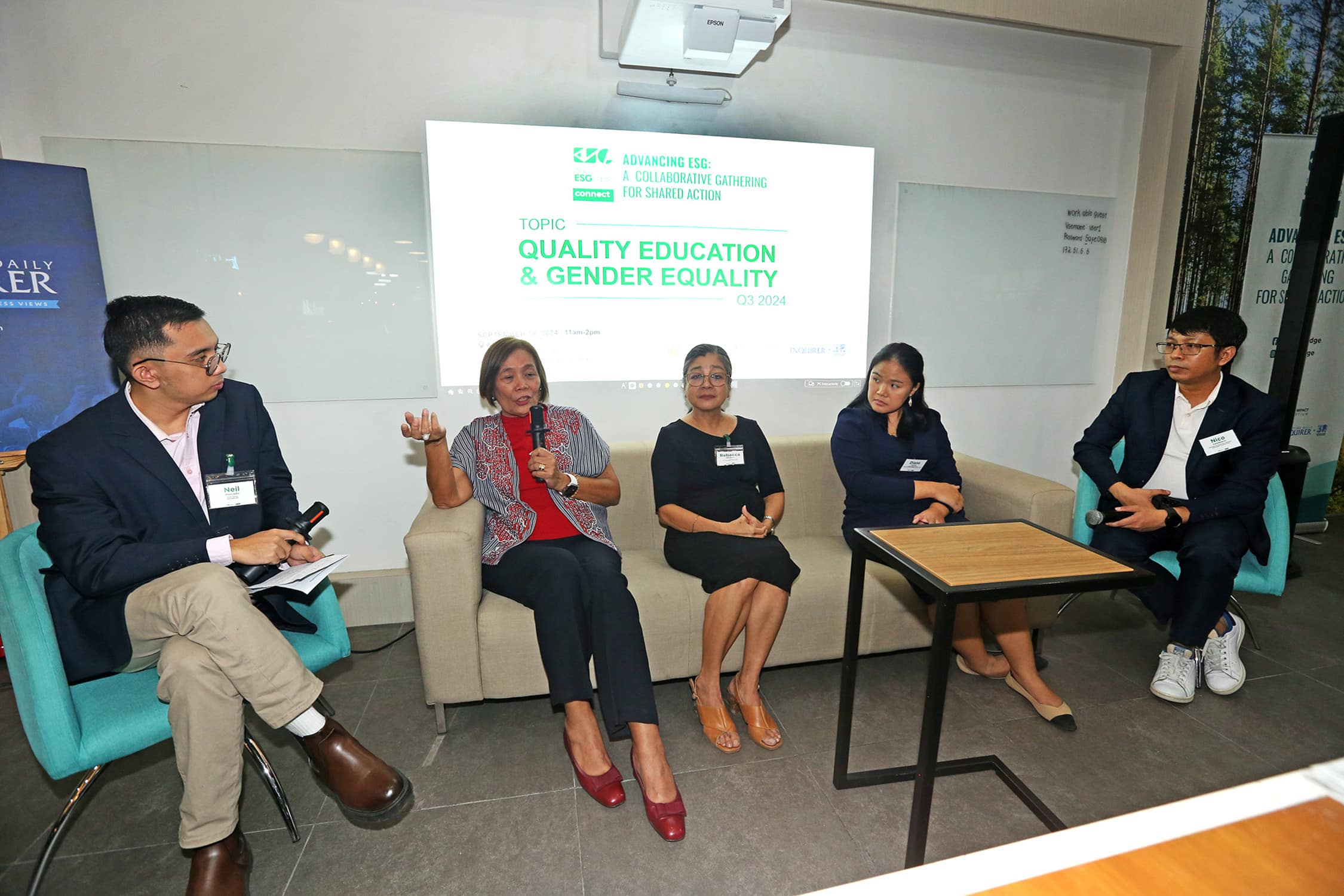Education issues tackled in Inquirer ESG Edge talks

SHARED CHALLENGES The first Inquirer ESG Edge forum and meeting with program partners on Sept. 18 featured talks by four experts in education and gender sensitivity. —Eugene Araneta
MANILA, Philippines — Lack of funding and the continuing need for reforms in the education system are among the pressing concerns requiring an immediate, holistic response from the public and private sectors.
In a recent forum hosted by the Inquirer, the first under its ESG Edge initiative, one of the solutions proposed was for the government to further “decentralize” its functions and “delegate” more of them to private schools.
It can start with the expansion of the current voucher system of the Department of Education which, in the process, can help reduce perennial classroom shortage, according to Diane Fajardo, deputy executive director of the Philippine Business for Education (PBEd).
READ: Education’s fundamental issues
Many private schools, Fajardo noted, have classrooms and facilities that are actually more than enough for their students.
“You have so many [public] schools lacking classrooms, [or making do] with dilapidated classrooms, with not enough teachers. But you also have private schools with classrooms, many buildings, learning systems—with not so many enrollees,’’ she said.
“While there is a lack of classrooms [in public schools], why not allow the private schools to take over some of these tasks in the meantime?” Fajardo added.
At present, the Department of Education’s voucher system covers only senior high school students, allowing them to enroll in private schools.
There is a bill pending in Congress—and supported by PBEd—to include more students in lower levels down to kindergarten among the voucher recipients, she said.
While new classrooms have yet to be built, “why not let the private sector handle those students?’’ she said.
“It’s government money and basically you’re delegating the tasks on education to the private sector. [And] the government still has responsibility over private schools considering its mandate to ensure all children [exercise their] right to basic education.”
Investors’ yardstick
The Inquirer ESG Edge initiative seeks to promote ESG (which stands for “environmental, social and governance” principles).
ESG is considered a yardstick by which private companies can be evaluated by potential investors based on their adherence to sound business practices, transparency and sensitivity to their community.
The ESG Edge forum held on Sept. 18 also served as the paper’s first general meeting with its program partners from the business sector, academe and civil society.
“Our moral obligation is to educate the people,” said another speaker, Nico Candelario, education and governance innovator for the Asian Institute of Management-Circularity Club 22.
“According to the Constitution, education gets the largest share of the pie, but the question is: How big is that portion of the pie in terms of our GDP (gross domestic product)?” he asked.
Challenge to media
At present, the national budget for education equals only 3.6 percent of the GDP, according to a study by the Philippine Institute for Development Studies, still lower than the standard set by the United Nations which is 4 to 6 percent.
In reality, Candelario said, the defense sector always gets the largest share of the budget, along with public works.
Also speaking at the forum, Rebecca Padilla-Marquez of the Communication and Women’s Studies departments of St. Scholastica’s College called for deeper media coverage of education and health issues to encourage stronger stakeholder involvement.
“All issues of health and education should also be in the front pages. So there should be a shift to what we find important,” she also said.
Aurora Geotina-Garcia of the Management Association of the Philippines spoke of how poor access to education contributes to generational poverty.
Suiee Suarez, who joined the audience as vice president for corporate affairs of Aboitiz Power, the presentations made by the speakers during the forum about the dire status of Philippine education would still strike the business community as an “eye-opener.”
“For us to address the problem, I believe we have to understand what the problem is,” Suarez said in an interview. “To change these, all these have to be recognized as systemic.’’